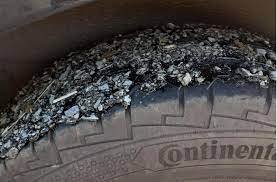As a vehicle proprietor or fan, you might have run over different legends and metropolitan legends encompassing cars. One especially interesting inquiry that frequently emerges is, “Can You Melt Car Tires?” While it could seem like a wild idea from the get-go, it’s vital to discrete reality from fiction and investigate the reality behind this captivating thought.
In this article, we mean to dive into the science behind tire synthesis, the softening mark of elastic, and the conditions that can prompt tire harm or disappointment. By revealing insight into this point, we can all the more likely comprehend the cutoff points and capacities of vehicle tires, dissipating any confusion en route.
Go along with us as we unwind reality with regards to dissolving vehicle tires, investigating the elements that add to their solidness, and making sense of the potential dangers related to presenting them to extreme intensity. Whether you’ve heard bits of hearsay or have a consuming interest in the subject, this article plans to give an extensive outline of this captivating point.
In this way, we should isolate truth from fiction and leave on an excursion through the science and real factors of dissolving vehicle tires. Lock in as we investigate the reality behind this dazzling car peculiarity.
Can You Melt Car Tires?
Liquefying vehicle tires might appear to be particular, however, it has been a subject of interest for some. This article plans to investigate the reality behind the normal inquiry: Can You Melt Car Tires? We will dive into the properties of vehicle tires, the temperatures expected for dissolving, and the misguided judgments encompassing this fascinating subject.
Yes, car tires can be melted, but doing so releases harmful toxins into the air and should be avoided for environmental and health reasons. Recycling or disposing of tires properly is a safer and more responsible option.
Understanding Vehicle Tire Arrangement

To understand the dissolving capability of vehicle tires, getting a handle on their composition is fundamental. Vehicle tires are regularly produced using a blend of different materials, including normal and manufactured elastic, texture, steel, and synthetic added substances. The elastic substance is the essential part liable for giving adaptability, strength, and footing.
The Liquefying Point of Vehicle Tires
The liquefying point of a substance alludes to the temperature at which it changes from a strong to a fluid state. On account of vehicle tires, the elastic part goes through a cycle called vulcanization, which includes the expansion of sulfur to upgrade its solidarity and intensity obstruction. This vulcanization interaction fundamentally raises the liquefying purpose in the elastic, making it try to dissolve vehicle tires utilizing ordinary strategies of the same brank tires.
The dissolving point of vulcanized elastic can fluctuate contingent on the particular tire compound. By and large, vehicle tires are intended to endure high temperatures out and about and are designed to have a high liquefying point. The softening place of elastic can go from roughly 180°C to 250°C (356°F to 482°F) or significantly higher, contingent upon the tire’s piece.
Could Vehicle Tires Be Liquefied?
While the elastic in vehicle tires has a high dissolving point, it is hypothetically conceivable to liquefy vehicle tires under outrageous circumstances. Accomplishing this, in any case, would require temperatures fundamentally higher than those experienced in regular situations. It is critical to take note that endeavoring to soften vehicle tires is easy yet additionally risky and ought to be completely stayed away from because of the poisonous vapor delivered during the interaction.
Confusions and Normal Legends
- Consuming Tires Equivalents Liquefying: One normal misinterpretation is that consuming tires will prompt their softening. Nonetheless, consuming tires principally brings about ignition, where the elastic goes through a substance response with oxygen, delivering intensity, light, and smoke. This cycle doesn’t liquefy the tires but instead breaks down the elastic into different side effects.
- Family Instruments are Lacking: Standard family apparatuses and machines, like stoves, blowtorches, or open-air fires, don’t create temperatures sufficiently high to soften vehicle tires. These strategies can cause ignition, which, as recently referenced, breaks down the elastic as opposed to dissolving it.
Natural Worries

Dissolving or consuming vehicle tires is impeding the climate and human well-being because of the arrival of poisonous gases, particulate matter, and unsafe synthetic substances. These discharges add to air contamination, soil pollution, and potential well-being gambles. It is urgent to discard vehicle tires capably through reusing or legitimate waste administration channels.
FAQs
Is it Possible To Melt Tires?
Liquefying tires under ordinary working conditions is beyond the realm of possibilities. Tires are intended to endure high temperatures created during driving. In any case, outrageous intensity, for example, from a huge fire or extreme modern cycles, can make tires relax and misshape, however by and large softening is exceptionally improbable because of their synthesis and heat opposition.
What Happens If You Melt A Tire?
At the point when you dissolve a tire, it goes through a perplexing compound change. At high temperatures, the elastic in the tire separates, delivering poisonous exhaust and establishing an unsafe climate. The subsequent liquid elastic is profoundly combustible and can present serious dangers. Furthermore, it adds to air contamination.
How Much Heat Can Tires Withstand?
Tires can endure a large number of temperatures, commonly between – 40°F to 200°F (- 40°C to 93°C). These cutoff points guarantee they perform well in different atmospheric conditions. Outrageous temperatures past these reaches can make elastic corrupt, prompting decreased foothold, solidness, and security. Legitimate support is critical for tire life span.
What Chemical Will Destroy Tires?
Tires are fundamentally made out of elastic, a strong material impervious to most synthetics. While solid acids and bases can debase elasticity after some time, no single synthetic can quickly obliterate tires. Tire removal and reusing ought to be overseen dependably to limit ecological effects and advance supportability.
What Will Dissolve Rubber Tires?
Elastic tires are profoundly impervious to most normal solvents and synthetic substances, making them challenging to disintegrate. Notwithstanding, a few forceful synthetics like concentrated sulfuric corrosive can to some extent separate elastic over the long haul. The best technique for discarding elastic tires is through reusing or proficient tire removal administrations to limit natural effects.
Conclusion:
Nonetheless, it is fundamental to recollect that outrageous intensity can in any case harm tires. Drawn-out openness to coordinate daylight or contact with blistering surfaces, for example, exhaust lines or black-top on a searing summer day, can prompt tire debasement, decreased execution, and even victories. It is urgent to rehearse legitimate tire support, including standard investigations, keeping up with appropriate filling levels, and staying away from inordinate paces or forceful driving, to guarantee tire life span and security.
While vehicle tires can’t be liquefied effectively, they can be reused to make new items, like rubber-treated black-top or athletic tracks. Reusing old tires lessens natural waste as well as advances manageability and the preservation of assets.
Sources:
- By Tam What can I use to melt tire rubber? Posted 5 Years Ago.

